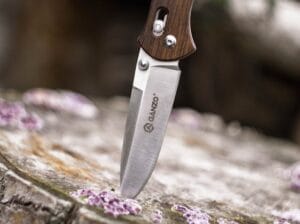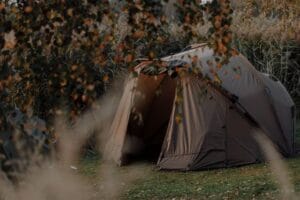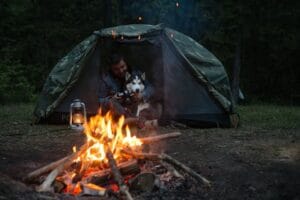Why a Wool Anorak Works for Bushcraft
Regarding bushcraft, a wool anorak provides warmth, comfort, and durability that other materials often struggle to match.
The natural qualities of wool make it ideal for outdoor use, especially when conditions are unpredictable. I’ve used wool anoraks in the woods and found that they strike a good balance between keeping me warm, allowing for movement, and withstanding the rough and tumble of bushcraft activities.
Here’s what makes them worth packing and how to choose one that fits your needs.
Warmth That Stays Even When Wet
The main reason I reach for a wool anorak in the field is its ability to keep me warm, even when the weather takes a turn for the worse.
Wool insulates well because its fibers trap air, which helps maintain body heat. More importantly, it doesn’t lose its warmth when it gets wet. I’ve been out in the woods during unexpected rain or snow, and while no one likes being soaked, the wool anorak kept me from getting cold the way synthetic layers often do.
There’s a steady, comfortable warmth that comes from wool that doesn’t feel overly stuffy.
The material breathes naturally, which makes a big difference when I’m working hard and building up some sweat. It keeps the heat in without causing that clammy feeling, which helps avoid the chill that can set in when you stop moving.
Durability That Stands Up to Rough Use
Bushcraft puts clothing through a lot more than just casual wear. When I’m moving through dense brush, crouching near the fire, or carrying gear, I need something tough enough to handle it.
A wool anorak is built for these conditions. The material resists abrasion better than many synthetic options, and I don’t have to worry about it melting if sparks fly from the fire.
Wool can handle rough treatment without tearing, which is especially useful when you’re not being gentle with your gear.
Some wool anoraks come with reinforced areas on the shoulders or elbows, which adds to their durability. These spots tend to see a lot of wear, especially when carrying a pack or leaning on rough surfaces.
A well-designed anorak includes these reinforcements or uses a denser weave that can handle more abuse.
It’s a practical feature that I appreciate when I’m out in the woods and not always paying attention to what my clothes are coming into contact with.
Comfort and Freedom of Movement
A wool anorak needs to be functional, and part of that means being comfortable to wear for long periods.
I’ve found that a properly fitted anorak allows for a full range of motion, which matters when you’re reaching, bending, or lifting. The cut should be loose enough to layer underneath but not so baggy that it gets in the way.
I like designs with gusseted armpits or articulated elbows, as they help keep the fabric from pulling or bunching up when I’m moving.
The pullover style of an anorak works well because it covers more of your body, keeping drafts out. A longer cut that reaches below the hips adds extra coverage and helps retain heat.
Some come with a cinched hem or waist drawstring, which lets you adjust the fit for better warmth retention. I’ve found this helpful on windy days or when I’m standing still for extended periods.
The Advantages of a Hood
An anorak’s hood is another feature that adds to its versatility. When I’m out in the cold or dealing with sudden gusts of wind, a good hood makes a big difference.
The best hoods have a snug fit that can be adjusted with drawstrings or toggles, allowing me to tighten them down to keep the wind from blowing in. A lined hood or one with a bit of structure keeps its shape, which helps prevent it from flapping around or falling back when I don’t need it.
I’ve used the hood on my wool anorak to stay warm during breaks or when sitting by the fire. It traps heat around my head and neck, which helps keep my whole body warm.
I like having the option to pull it up or leave it down depending on how much coverage I need.
It’s these small adjustments that can make a big difference when you’re out for hours and the temperature keeps changing.
Examples of Wool Anoraks That Hold Up
1. Lester River Bushcraft Boreal Shirt
The Lester River Bushcraft Boreal Shirt is a heavy-duty wool anorak designed for cold weather and rugged outdoor conditions.
Made from a thick 90% wool blend, it provides excellent warmth while still allowing for some breathability, making it suitable for bushcraft and winter camping. The longer cut offers extra coverage below the waist, while the roomy fit allows for layering underneath.
The anorak includes a large chest pocket for stashing small gear, keeping essentials close at hand. With its durable construction and simple design, the Boreal Shirt is built to withstand rough use in the woods, keeping you warm and comfortable in harsh conditions.
Pros: Heavy wool blend for warmth, durable construction, practical longer cut.
Cons: Not fully waterproof, heavier than some lighter wool options.
2. Asbell Wool Anorak
The Asbell Wool Anorak offers a versatile option for bushcraft enthusiasts who need a lighter wool layer.
Made from a soft, durable wool blend, it provides natural warmth and breathability without being overly bulky. The looser fit makes it suitable for wearing over base layers, and the longer length adds extra coverage.
The simple pullover design features an adjustable hood for added protection against the elements. While the Asbell may not be as thick as other heavy-duty options, its lightweight nature makes it ideal for layering in different temperatures and conditions.
Pros: Lightweight and breathable, versatile for layering, comfortable fit.
Cons: Less insulating than heavier wool anoraks, no reinforced areas for high-wear spots.
When a Wool Anorak Isn’t Enough
While wool anoraks perform well in most bushcraft scenarios, they have limitations. They’re not fully waterproof, so if I know I’ll be dealing with heavy rain, I layer a waterproof shell over the anorak.
Wool can absorb a lot of moisture without losing warmth, but eventually, it does get saturated. Having a shell layer on hand ensures I stay dry in extended downpours.
For very windy conditions, wool provides some wind resistance, but it won’t block strong gusts like a windbreaker would. In these situations, using the anorak as a mid-layer under a wind-resistant outer layer works better.
The anorak provides warmth while the shell cuts the wind, giving me the best of both worlds.
Final Thoughts
A wool anorak is a practical choice for bushcraft, offering warmth, durability, and comfort that other materials struggle to match.
The natural qualities of wool make it well-suited for outdoor use, where conditions can change quickly. When choosing a wool anorak, look for one that balances fit, reinforcements, and coverage to match the type of bushcraft you do.
It’s a piece of gear that can serve you well, whether you’re huddling by the fire or trekking through the woods.
You might as well be interested in
-

A new sample Post by me
Lorem ipsum dolor sit amet, consectetur adipiscing elit. Pellentesque imperdiet tincidunt augue, sit amet pharetra massa condimentum varius. Ut condimentum turpis blandit augue ultricies porta.…
-
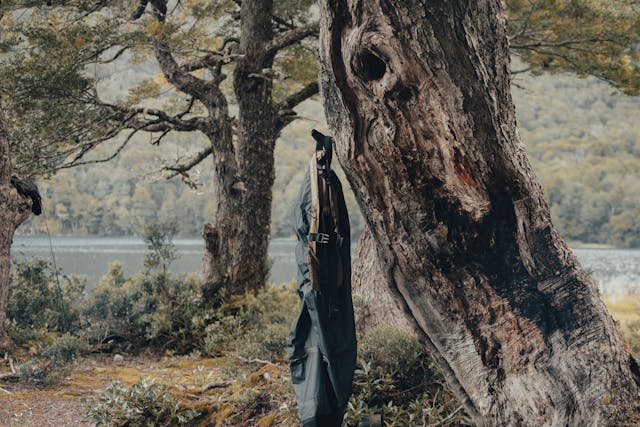
Best Bushcraft Pants: Tough, Comfortable, and Built for the Outdoors
What to Look for in Bushcraft Pants Finding the right bushcraft pants isn’t about following the latest trends. When you’re out in the woods, durability,…
-
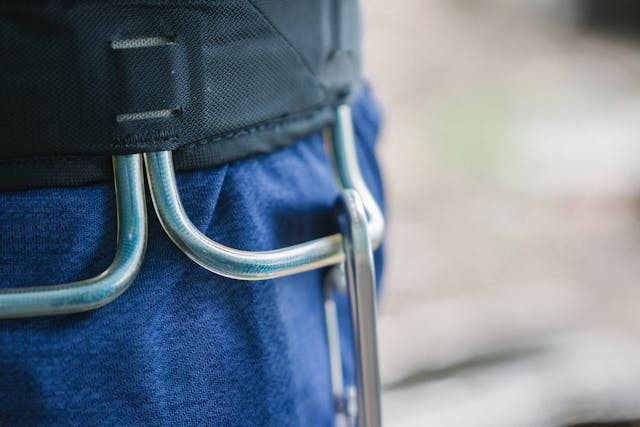
Bushcraft Belt: Choosing the Right One for the Outdoors
Why a Good Bushcraft Belt Matters A solid bushcraft belt is more than just a way to keep your pants up. When you’re out in…
-

Bushcraft Coats: Staying Warm and Dry in the Woods
Why the Right Bushcraft Coat Matters A good bushcraft coat isn’t just about staying warm—it’s about staying functional in the field. When I’m out in…
-

Wool Bushcraft Blankets That Deliver Warmth and Toughness in the Wild
Why I Pack a Wool Bushcraft Blanket A wool bushcraft blanket is one of the most useful pieces of gear I carry in the woods.…
-

Wool Anoraks for Bushcraft: How to Stay Cozy in the Wild
Why a Wool Anorak Works for Bushcraft Regarding bushcraft, a wool anorak provides warmth, comfort, and durability that other materials often struggle to match. The…
-
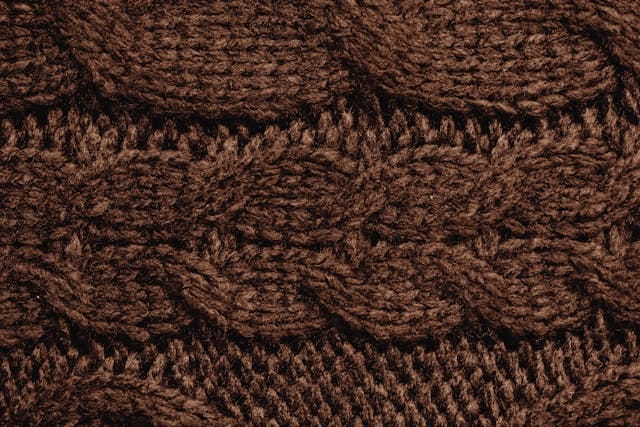
Bushcraft Wool Hoodies That Deliver: Warmth, Comfort, and Durability in the Woods
Why a Bushcraft Wool Hoodie Makes Sense A bushcraft wool hoodie isn’t just another layer—it’s one that works well in the woods where conditions change…
-
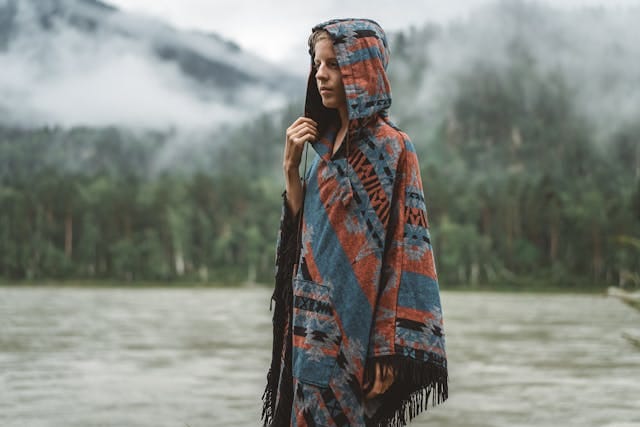
Bushcraft Ponchos That Work: Stay Dry and Ready for Anything
Why a Bushcraft Poncho Is Worth Packing A bushcraft poncho does more than just keep you dry during unexpected rain. It’s a versatile piece of…
-

Bushcraft Jackets That Get the Job Done: Stay Warm, Dry, and Comfortable
Why the Right Bushcraft Jacket Makes a Difference A solid bushcraft jacket isn’t just about keeping warm. It’s about having the right protection and comfort…
-

Bushcraft Clothes – How To and Why
Bushcraft Clothes: Dressing for the Wild When I head into the wilderness, choosing the right clothes becomes a crucial part of my preparation. Bushcraft clothing…


